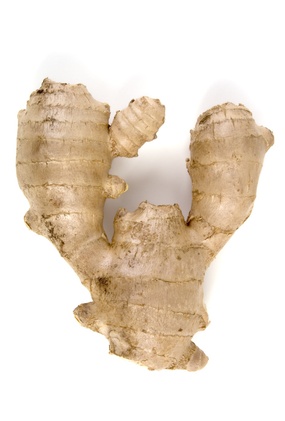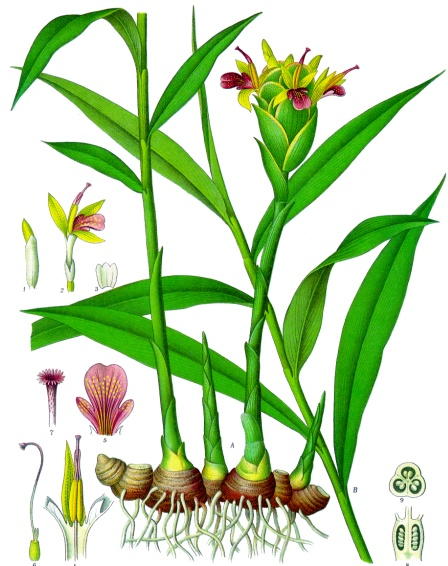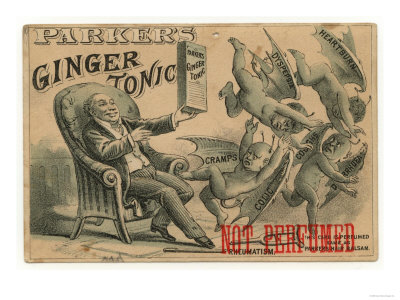Zingiber officinale (Roscoe)
Synonyms: Jamaica ginger, African ginger, black ginger, race ginger
Order: Zingiberaceae
 Description: Zingiber is a creeping perennial plant
native to
tropical south-east Asia and cultivated in the West Indies, Africa and India.
The aromatic, knotty rootstock is thick and fibrous, and whitish or buff in
colour.
It produces a simple, leafy stem covered with the leaf sheaths of the lanceolate-oblong
to linear leaves, and reaches a height of 1.25m. The leaves areup to30cm long and
the sterile flowers are white with purple streaks and grow in small dense spikes.
Description: Zingiber is a creeping perennial plant
native to
tropical south-east Asia and cultivated in the West Indies, Africa and India.
The aromatic, knotty rootstock is thick and fibrous, and whitish or buff in
colour.
It produces a simple, leafy stem covered with the leaf sheaths of the lanceolate-oblong
to linear leaves, and reaches a height of 1.25m. The leaves areup to30cm long and
the sterile flowers are white with purple streaks and grow in small dense spikes.
Part used: rhizome, preferably fresh; oil.
Collection: the rhizome is collected after the leaves have dried.
Constituents: Volatile oil (including zingiberine, zingiberole, phellandrene, borneol, cineole and citral); phenols (gingeole, zingerone), shagaol, starch, mucilage, resin, and a possible alkaloid.
Actions: Peripheral circulatory stimulant, carminative, antiflatulent, antitussive, antiemetic, rubefacient, diaphoretic, anti-inflammatory, spasmolytic, adjuvant, sialagogue, expectorant, antiseptic.
Indications: Poor circulation, chilblains and cramp, nausea
Therapeutics and Pharmacology: In
feverish conditions Zingiber's diaphoretic action promotes perspiration. As a
carminative it promotes gastric secretion and is used in the treatment of dyspepsia, flatulence
and colic. It is also a useful remedy in diarrhoea where there is no inflammation.
It is stimulant to the gastro-intestinal tract, increasing peristalsis and the tone of the intestinal
muscle. As
an antiemetic it can be used in cases morning sickness. It is also said to be useful for suppressed menstruation.
The fresh rootstock may be chewed to stimulate the flow of saliva or to soothe a sore
throat. As a gargle
it can also relieve a sore throat. Extracts of ginger stimulate the vasomotor and respiratory centres.
perspiration. As a
carminative it promotes gastric secretion and is used in the treatment of dyspepsia, flatulence
and colic. It is also a useful remedy in diarrhoea where there is no inflammation.
It is stimulant to the gastro-intestinal tract, increasing peristalsis and the tone of the intestinal
muscle. As
an antiemetic it can be used in cases morning sickness. It is also said to be useful for suppressed menstruation.
The fresh rootstock may be chewed to stimulate the flow of saliva or to soothe a sore
throat. As a gargle
it can also relieve a sore throat. Extracts of ginger stimulate the vasomotor and respiratory centres.
Externally, Zingiber is the basis of many fibrositis and muscle strain treatments. In China the fresh root, sheng jiang, is used to promote sweating and as an expectorant for colds and chills. It is also roasted in hot ashes and used to treat diarrhoea or to stop bleeding. The dried root, gan jiang, is used to warm and stimulate the stomach and lungs, and is an effective yang restorative.
Contraindications: High doses should be avoided if the stomach is already hot and over-stimulated, as in peptic ulceration. It should be used with care in early pregnancy, although it can be safely taken in small doses (1g dried root) for morning sickness.
Combinations: Ginger can be combined with Gentiana and Rheum palmatum for sluggish digestion with constipation. Combine with laxative herbs to make them more palatable or milder in action. Combines well with Juniper or Eucalyptus oil as a massage oil.
Preparation and Dosage:
Regulatory Status: GSL
Infusion: pour a cup of boiling water onto 1 teaspoon of fresh root and infuse for 5 minutes. Drink as required.
Decoction: Put 1-1.5 teaspoons in a cup of water and simmer for 5-10 minutes. Drink as required. for chills and catarrhal colds.
Tincture: 1.5-3ml weak tincture three times a day or 0.25-0.5ml strong tincture three times a day as a warming circulatory stimulant or for flatulence, indigestion and nausea.
Capsules: 1 or 2 x 200mg before a journey against travel sickness. Up to 1g doses for morning sickness.
Oil: take 1-2 drops on a sugar lump or in a teaspoon of honey for flatulence, menstrual cramps, nausea or stomach upsets.
Massage oil: 5-10 drops in 25ml almond oil for rheumatism or lumbago.

Additional Comments: The word ginger comes from the ancient Sanskrit singabera, meaning 'shaped like a horn'. It first appeared in the writings of Confucius in the 5th century BC. and it has been used medicinally in the West for at least 2000 years. It was introduced by the Spaniards to the Americas and is now cultivated extensively in the West Indies. The Portuguese introduced it to West Africa. It was traditionally used to warm the stomach and dispel chills. In the 18th century it was added to remedies to modify their action and to reduce their irritant effects upon the stomach. Ginger is still used in this way in China to reduce the toxicity of some herbs. The Chinese prescribe ginger tea for delayed menstruation. It is rich in vitamin C, and Chinese mariners ate it fresh to ward off scurvy.
Bibliography
Al-Suhaimi EA, Al-Riziza NA, Al-Essa RA. 2011 Physiological and therapeutical roles of ginger and turmeric on endocrine functions. Am J Chin Med. 2011; 39 (2) :215-31. PubMed PMID:21476200.
BHMA 1983 British Herbal Pharmacopoeia, BHMA, Bournemouth.
Black CD, O'Connor PJ. 2010 Acute effects of dietary ginger on muscle pain induced by eccentric exercise. Phytother Res. 2010 Nov; 24 (11) :1620-6. PubMed PMID:21031618.
Bradley, P.R. (ed.) 1992 British Herbal Compendium, Volume 1, BHMA, Bournemouth.
Cady RK, Goldstein J, Nett R, Mitchell R, Beach ME, Browning R. 2011 A Double-Blind Placebo-Controlled Pilot Study of Sublingual Feverfew and Ginger (LipiGesic(TM) M) in the Treatment of Migraine. Headache. 2011 Jun 1; PubMed PMID:21631494.
Ebrahimi N, Maltepe C, Einarson A. 2010 Optimal management of nausea and vomiting of pregnancy. Int J Womens Health. 2010 Aug 4; 2:241-8. PubMed PMID:21151729; PubMed Central PMCID: PMC2990891.
Grieve, M. 1931 A Modern Herbal, (ed. C.F. Leyel 1985), London.
Hoffmann, D. 1990 The New Holistic Herbal, Second Edition, Element, Shaftesbury.
Hu ML, Rayner CK, Wu KL, Chuah SK, Tai WC, Chou YP, Chiu YC, Chiu KW, Hu TH. 2011 Effect of ginger on gastric motility and symptoms of functional dyspepsia. World J Gastroenterol. 2011 Jan 7; 17 (1) :105-10. PubMed PMID:21218090; PubMed Central PMCID: PMC3016669.
Iwami M, Shiina T, Hirayama H, Shima T, Takewaki T, Shimizu Y. 2011 Inhibitory effects of zingerone, a pungent component of Zingiber officinale Roscoe, on colonic motility in rats. J Nat Med. 2011 Jan; 65 (1) :89-94. PubMed PMID:20799069.
Lu J, Guan S, Shen X, Qian W, Huang G, Deng X, Xie G. 2011 Immunosuppressive activity of 8-gingerol on immune responses in mice. Molecules. 2011 Mar 22; 16 (3) :2636-45. PubMed PMID:21441866.
Lust, J. 1990 The Herb Book, Bantam, London.
Madkor HR, Mansour SW, Ramadan G. 2011 Modulatory effects of garlic, ginger, turmeric and their mixture on hyperglycaemia, dyslipidaemia and oxidative stress in streptozotocin-nicotinamide diabetic rats. Br J Nutr. 2011 Apr; 105 (8) :1210-7. PubMed PMID:21144104.
Maghsoudi S, Gol A, Dabiri S, Javadi A. 2011 Preventive effect of ginger (Zingiber officinale) pretreatment on renal ischemia-reperfusion in rats. Eur Surg Res. 2011; 46 (1) :45-51. PubMed PMID:21150209.
Matthews A, Dowswell T, Haas DM, Doyle M, O'Math�na DP. 2010 Interventions for nausea and vomiting in early pregnancy. Cochrane Database Syst Rev. 2010 Sep 8; PubMed PMID:20824863.
Mills, S.Y. 1993 The A-Z of Modern Herbalism, Diamond Books, London.
Ody, P. 1993 The Herb Society's Complete Medicinal Herbal, Dorling Kindersley, London.
Pertz HH, Lehmann J, Roth-Ehrang R, Elz S. 2011 Effects of Ginger Constituents on the Gastrointestinal Tract: Role of Cholinergic M3 and Serotonergic 5-HT3 and 5-HT4 Receptors. Planta Med. 2011 Feb 8; PubMed PMID:21305447.
Pillai AK, Sharma KK, Gupta YK, Bakhshi S. 2011 Anti-emetic effect of ginger powder versus placebo as an add-on therapy in children and young adults receiving high emetogenic chemotherapy. Pediatr Blood Cancer. 2011 Feb; 56 (2) :234-8. PubMed PMID:20842754.
Rani MP, Padmakumari KP, Sankarikutty B, Cherian OL, Nisha VM, Raghu KG. 2011 Inhibitory potential of ginger extracts against enzymes linked to type 2 diabetes, inflammation and induced oxidative stress. Int J Food Sci Nutr. 2011 Mar; 62 (2) :106-10. PubMed PMID:20874376.
Richardson, R. 1988 The Little Spice Book, Piatkus, Loughton.
Sahebkar A. 2011 Potential efficacy of ginger as a natural supplement for nonalcoholic fatty liver disease. World J Gastroenterol. 2011 Jan 14; 17 (2) :271-2. PubMed PMID:21246004; PubMed Central PMCID: PMC3020385.
Saraswat M, Suryanarayana P, Reddy PY, Patil MA, Balakrishna N, Reddy GB. 2010 Antiglycating potential of Zingiber officinalis and delay of diabetic cataract in rats. Mol Vis. 2010 Aug 10; 16:1525-37. PubMed PMID:20806076; PubMed Central PMCID: PMC2925903.
Tan PC, Omar SZ. 2011 Contemporary approaches to hyperemesis during pregnancy. Curr Opin Obstet Gynecol. 2011 Apr; 23 (2) :87-93. PubMed PMID:21297474.
Ueda H, Ippoushi K, Takeuchi A. 2010 Repeated oral administration of a squeezed ginger (Zingiber officinale) extract augmented the serum corticosterone level and had anti-inflammatory properties. Biosci Biotechnol Biochem. 2010 Nov 23; 74 (11) :2248-52. PubMed PMID:21071834.
Wattanathorn J, Jittiwat J, Tongun T, Muchimapura S, Ingkaninan K. 2011 Zingiber officinale Mitigates Brain Damage and Improves Memory Impairment in Focal Cerebral Ischemic Rat. Evid Based Complement Alternat Med. 2011; 2011:429505. PubMed PMID:21197427; PubMed Central PMCID: PMC3010628.
Weiss, R.F. 1991 Herbal Medicine, Beaconsfield Arcanum, Beaconsfield.
Wild, A. 1995 The East India Company Book of Spices, Harper Collins, London.
Wren, R.C. 1988 Potter's New Cyclopaedia of Botanical Drugs and Preparations, C.W.Daniel, Saffron Walden.
Yu Y, Zick S, Li X, Zou P, Wright B, Sun D. 2011 Examination of the Pharmacokinetics of Active Ingredients of Ginger in Humans. AAPS J. 2011 Jun 3; PubMed PMID:21638149.










